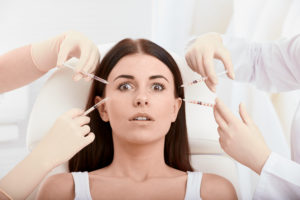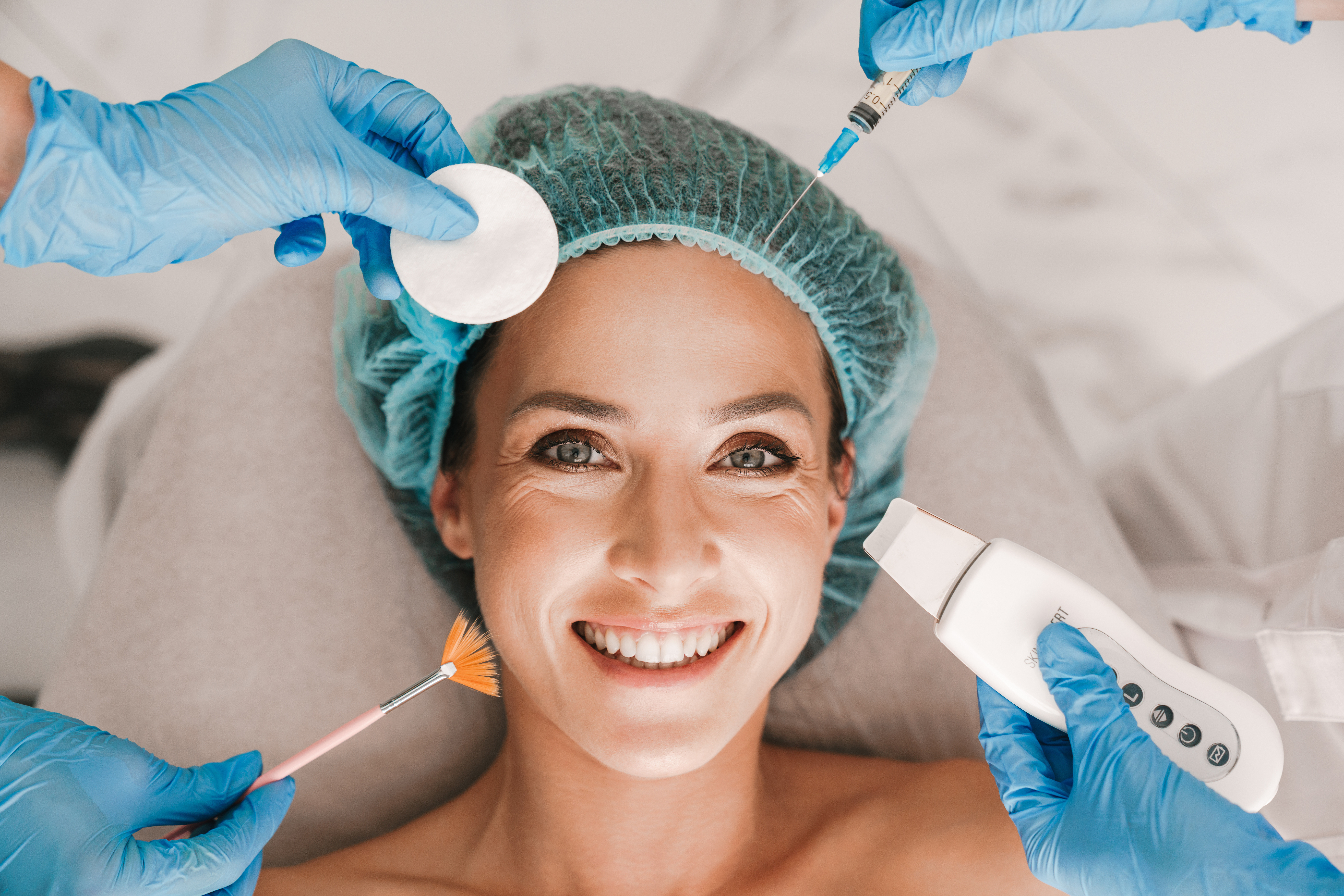
Cosmetic Procedures in Australia: What we’re NOT talking about
Last updated on October 31st, 2022
Cosmetic procedures are becoming increasingly popular in Australia. From injectables and fillers for your lips and cheeks, Botox for your wrinkles, and even laser hair removal for your unwanted fuzz. They have become so common that these techniques are even offered at dentists and beauty salons. This is concerning, since these methods are not simply beauty treatments.
The Australian Health Practitioner Regulation Agency (AHPRA) regulates that medical practitioners should perform them. Or at least, a doctor should be supervising a nurse. But, there's a loophole in the Guidelines for Registered Medical Practitioners Who Perform Cosmetic Medical and Surgical Procedures. AHPRA doesn't regulate beauty therapists. This means beauty therapists can perform medical procedures on you with some requirements. Let’s dive deep into cosmetic procedures in Australia and how they can affect you.
How do these treatments work?
Getting a cosmetic procedure is pretty straightforward. If you want a procedure done, you find a clinic, book an appointment, and go in for a consultation. It’s much like getting your hair done, except for the fact that these procedures are more invasive and can leave permanent issues and scars.
Dermal fillers and anti-wrinkle treatments like Botox are prescription-only products. Be wary of how and by whom you have these injected into your epidermis.
Laser hair removal also has some risks and it is also considered a medical procedure. You may not realise it, but the treatment penetrates your skin like injectables. It uses a concentrated beam of light or laser to damage your hair follicles.
Your consultation should involve a medical doctor because it takes into account your medical history, such as allergies, health issues, and medication. However, there's a clause in the guidelines that can lead to less than thorough medical consultations before a cosmetic procedure.
Tele-consultations through platforms like Skype are allowed. This practice can lead to short consultations with few questions asked and answered while still fulfilling the requirement of meeting with a doctor “face-to-face”. Think twice about how safe it is for you to have a doctor "examine" you for a minor procedure through a one-minute Skype or FaceTime call.
What can go wrong?
Much like any medical procedure, there are side effects involved with cosmetic procedures. They are more significant than you think! The hazards can range from headaches to death. We’ve listed some so that you’re aware of potential risks.
Death
Injecting a filler into the wrong area of your face or body can permanently damage you. It can even become fatal. One of the most critical drugs that can cause you harm is Belkyra. It's a fat-melting acid that’s popularly used to treat double chins. It can be lethal if injected directly into an artery going to the brain.
Blindness
There have been reports of people being blinded because of lip and cheek dermal filler infections. Yes, the filler doesn’t even have to be near your eyes to cause blindness. These cases are usually permanent.
“Killing” Parts of the Face
This doesn’t only mean numbness. It can actually be your nose or lips turning black and falling off! Injecting the wrong part of your face, the facial artery, usually causes this. This kills the tissue.
Paralyses
Your muscles can go into paralysis that can last around three months. This has been reported for Botox, the popular brand of Botulinum toxin. Although this is a lesser risk, it is still dangerous.
Infections
If your clinician does not administer your treatment correctly, this may cause infections. This can cause pain and swelling, among other complications.
Anti-wrinkle injection immunity
Anti-wrinkle injections wear off. If you have it done too often, you can build an immunity to it. This happens because a bacterial toxin makes up the product. We develop immunity when our body creates antibodies to stifle the foreign substances and agents, much like in vaccines.

Semi-permanence of dermal fillers
Studies say that fillers, such as hyaluronic acid, are temporary. They last for 6-18 months. But, research has found that an MRI can detect fillers more than 10 years after your procedure. Apparently, they do not “dissolve” when you see the results minimise. They just spread out through your body, making them thinner in the areas they were injected.
Burns and scarring
Procedures such as laser hair removal use a concentrated light beam to ultimately destroy your hair follicles. This light is converted to heat which damages the part of your skin that produces hair. Done improperly, this may cause burns that may could to scarring.
Headaches
This is a ‘common’ side effect for procedures like Botox. Headaches aren’t as dangerous as other side effects but they are still unpleasant and worth asking yourself if they’re worth the risk.
Fake Medicine
Counterfeiters can copy almost any product these days. You can learn more about fake products here. Using a fake product can cause side effects, including the most dangerous ones. You can’t easily spot knock-off drugs but you can make sure that you visit an AHPRA accredited clinic. This can help ensure that the products used are authentic and regulated.
What are the regulations?
Cosmetic medical procedures are not very well regulated. It seems regulators are still catching up with the popularity and proliferation of these treatments.
The first thing to look out for in any regulation is: who does it apply to? Guidelines for Registered Medical Practitioners Who Perform Cosmetic Medical and Surgical Procedures only covers licensed doctors and nurses. They do not regulate beauty therapists or technicians.
There are dangers in having minor cosmetic medical procedures administered by a clinician who hasn't received adequate training. Some who provide these treatments consider a two-day training course enough. Do you believe that two days training will equip a clinician to deal with any side effects that may arise? Asking about training and experience is important, don't you agree?

The regulations also include these salient points:
-
- Guidelines recommend that doctors perform cosmetic procedures. Nurses under a doctor's supervision can do it as well. This is because dermal fillers and Botox are prescription-only products.
- Your clinician should discuss the products they will use in private consultations. They should not advertise specific products in public. This is so you know you’re getting good quality drugs (and not counterfeits).
- The Therapeutic Goods Association (TGA) should approve all products used in your procedure. You can read more about TGA-approved products here.
- Cooling-off periods apply for minors who want to have cosmetic procedures.
- There are financing options allowed by the regulation. These include instalment and other payment plans like Buy Now, Pay Later (BNPL). To learn more about BNPL, you may read this article.
What can you do when a mistake happens?
What if your cosmetic procedure causes you harm? Is there something you can do about it? Can you get a refund?
For now, AHPRA only regulates refunds on deposits. But, there are some cosmetic surgery compensation claims you can look into.
You can file for a claim if the danger caused to you was due to medical negligence. It can occur during or after your procedure. Compensation includes reimbursement of medical procedures or coverage for lost income.
How do you know if you’re going to a good clinician?
Although usually advertised as beauty treatments, cosmetic medicine procedures are medical. This means that there are risks involved. If choosing a clinic for the first time:
-
- Ask for recommendations from people you trust who have had a procedure done.
- Do a lot of research. Check social media and the internet for review make sure they’re not fake ones). Find success stories and even cosmetic surgery fails.
- Don’t get anything done during the first consultation. Just ask questions. See if you’re comfortable with your clinician and their skill level.
- During your first visit, ask what will happen if something goes wrong. Assess the clinic's preparedness for accidents during your procedure and other medical emergencies.
- Start with something small and build confidence over time with minor procedures. Mistakes are less noticeable and they will hopefully fix themselves without too much intervention. Try getting only Botox in a small portion of your face. Or, get a laser hair removal on a small and unnoticeable patch of your skin.

Questions to ask your chosen clinician before getting cosmetic surgery
-
- Is there a comprehensive consultation with a registered doctor?
- Is the consultation personal, and not a quick one-minute digital teleconsultation?
- Will there be a consent form to sign after you're informed of the risks and side effects?
- Is the clinic registered with your local council and not a run-of-the-mill beauty salon?
- Are the products used disclosed during your consultation and are they approved by TGA for Australian use?
- Have you been informed how complications will be treated if they arise?
- Has the clinic got resuscitation equipment and expertise in case of an emergency? You can look for medical oxygen and a defibrillator.
- Does your clinician belong to an educational society or college? It is also important to check if their institution has a continuing cycle of peer-reviewed education.
- Better yet, can you find the clinician’s name (the one performing the procedure) on the Australian Health Practitioner Regulation Agency (AHPRA) website?
The answer to all these questions should be a big YES. If you’re not sure, think twice before you let a clinician perform your treatment.
Let’s face it, not all treatments turn out perfectly. If you’re not satisfied with your laser hair removal, or have experienced an adverse event with your Botox or cheek and lip dermal fillers, you can lodge a complaint with us and we’ll make sure it gets to the right people. Just say the magic words: 'Help Me Handle It'.



